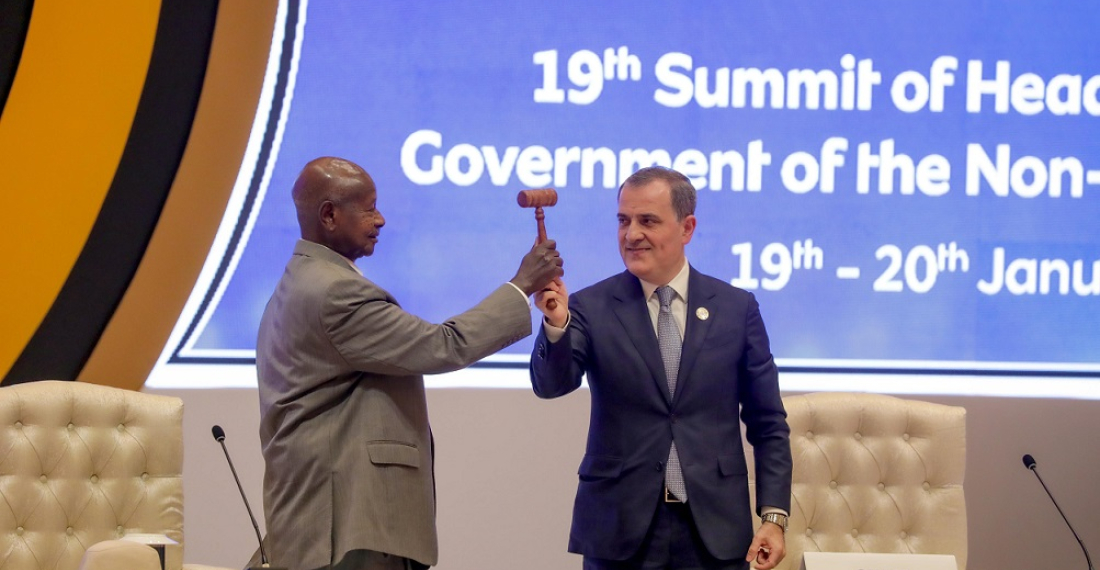The chairmanship of the Non-Aligned Movement, a grouping of 120 countries, mainly in the global South, passed on Friday morning from Azerbaijan to Uganda.
President Yoweri Museveni was elected by acclamation as the chair of the 19th NAM Heads of State and Government Summit taking over from Ilham Aliyev.
Azerbaijani foreign minister, Jeyhun Bayramov, represented the outgoing president Aliyev. He congratulated Uganda and President Museveni for assuming the NAM chairmanship and promised that his country will extend all the necessary support to ensure success of the movement.
“Azerbaijan chairmanship has done its best to make the voice of our members heard in all possible platforms with successful initiatives and there’s no doubt that Uganda’s chairmanship will continue with this legacy, even further building upon it,” he said.
“At this historic moment, after four years of proudly chairing the movement, we are handing over the chairmanship to the Republic of Uganda with a rich substantial and institutional legacy and we are confident that Uganda will further enhance the development feasibility of the movement and strengthen unity among its member states. I would like to reiterate that our passion and determination for the success of NAM will always remain strong and we will continue to contribute to the just cause.”
Bayramov also highlighted some of the successes they have achieved during their chairmanship. He said during their term, they played a key role in the institutional development of the movement as well as putting up a number of initiatives to combat Covid-19, among other challenges affecting member states.
“During its chairmanship, Azerbaijan took practical steps to uphold the interests of member states at the international arena, guided by the principle of cementing solidarity and extending mutual support,” he said.
On the other hand, Bayramov revealed that at the Ministerial meeting held in Baku in July, 2023, they agreed to forward the request of South Sudan, the only non-member state of NAM from the African continent, for a fully-fledged membership in the movement.
“The admission of South Sudan will be the first expansion of NAM membership in 13 years bringing the number of members to 121. This proves the increasing importance of our movement in the international relations system.”
In his speech, President Museveni informed the Heads of State and Heads of Delegations that Uganda’s stand is that the world should concentrate on the common human problems ─ prosperity through trade, the advance of science and technology to deal with human problems, the environment, crime and terrorism. He said such ideas are in line with the Bandung Principles, a basis on which NAM was formed.
“It is on these principles that NAM was founded. We, the resistance fighters of Uganda, can testify that by synthesizing the package of ideas, we have got very good results. Using the ideas of the free market, combined with the ideas of selective State intervention in the economy in some sectors like banking, energy, transport, etc. and also bringing back some aspects of the pre-capitalist institutions such as reformed cultural institutions, Uganda, although starting from a very low base, has had growth rates of 6.2% per year, for the last 37 years.”
He further urged that the world should only have free associations of nations where people of a common or shared origin, interact for mutual advantage with the peoples of the World.
“The future is bright if we act right,” he said.
The President further disclosed that as the resistance fighters of Uganda, they are flabbergasted and look down with contempt, at the philosophical, ideological and strategic shallowness of some of the actors in the World who use their scientific advancements to oppress others. He also cautioned leaders against imposing their narrow uni-ideological orientation to a society they live in , let alone the world.
“The oppressors miscalculate when they use their temporary advantage in science and technology to think that they can use that to indefinitely oppress other people. The oppressed will learn, catch up and defeat the oppressor. That is why Empires always collapse. The idea of Empires is an evil idea,” President Museveni asserted.
“Why do you not seek to influence people by your good example, instead of manipulation, lectures and threats? Chauvinists of race, religion, tribe or gender, should stop wasting our time and opportunities, with their shallow schemes. Action will, inevitably, invite counteraction. Oppression will invite Resistance. We are, therefore, not impressed and cannot be part of the morbid bigotry of uni-ideological thinking of this or that type. The universe has been here for the last 30 billion years, and human society has been here for the last 4½million years,” he added.
On the other hand, the President advised that the strength of NAM should be used to exercise considerable influence particularly at the UN for the effective transformative process for a better common future.
“In the negotiations for the Pact of the Future, the outcome document of the upcoming United Nations Summit of the Future to be held in New York in September, 2024, we should clearly define priorities that favour developing countries by maintaining unity, solidarity and collective coordination among our Member States, in line with the Bandung principles. I assure you all that my team, led by the Permanent Representative in New York has my full support to chair the Coordinating Bureau of the Non-Aligned Movement,” he emphasised.
source: commonspace.eu with Ugandan media and agencies
photo: Azerbaijan foreign minister Jeyhun Bayramov formally handing the chairmanship of the NAM movement ot the President of Uganda, Yoweri Mouseveni (picture courtesy of the press service of the Government of Uganda)







